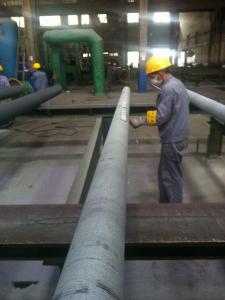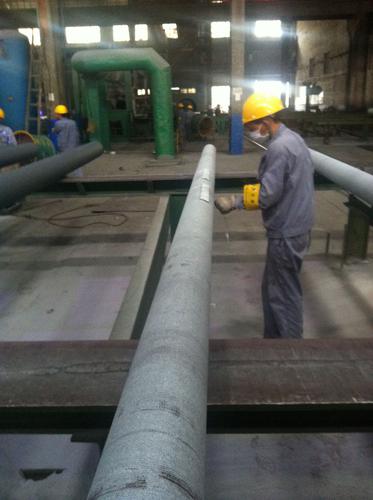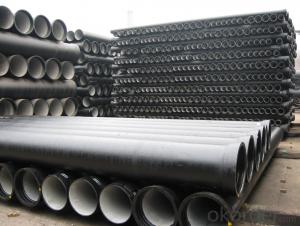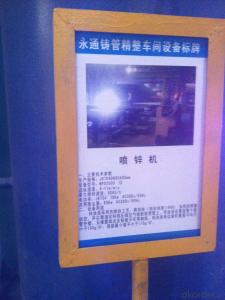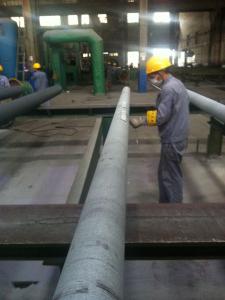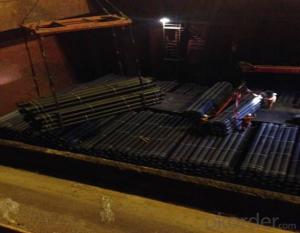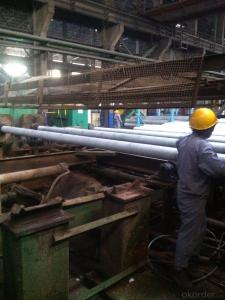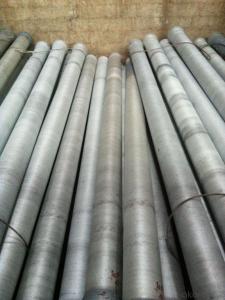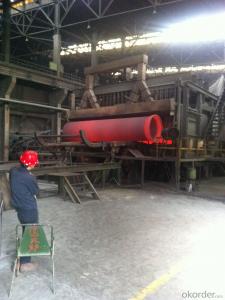DUCTILE IRON PIPE AND PIPE FITTINGS K9 CLASS DN700
- Loading Port:
- Tianjin
- Payment Terms:
- TT OR LC
- Min Order Qty:
- 21 pc
- Supply Capability:
- 3000 pc/month
OKorder Service Pledge
OKorder Financial Service
You Might Also Like
Material : Ductile Cast Iron
Size Range : DN 80mm to DN 2000mm
Unit Effective Length : 6m or 5.7m
Manufacture Standard: ISO 2531:1998/ EN 545:2006/EN 598:2007
Annual capacity : 200,000 tons
Coating Exterior: Zinc 130g/m2 according to ISO 8179-1 and bitumen coating 70 microns.
Cement Interior: Portland Cement/ High Alumina Cement/ Sulphate Resisting Cement Lining according to ISO 4179
Special requirements on external coating and internal lining can be applied
We also provide accessories such as SBR/EPDM rubber gaskets, lubricant paste, pipe caps, PE sleeves, etc.
Additional Parts:
Each pipe is strictly inspected according to related standard to ensure permanently high performance.
Easy Installation at site and service free for life
Long Service Lifespan
Quotation will arrive you within 24hours once we get your inquiry.
We guarantee offering you a competitive price.
A copy of original inspection reports of pipes will be offered after shipment.
Photos of loading process will be sent to the customer after shipment effect.
We will follow-up the delivery progress after shipment effect and update to the customer on weekly basis.
- Q: What material is the cutting tool for ductile iron?
- They are all hard alloy materials, all of which are CVD coatings, but the products produced by different manufacturers will be very different.
- Q: How are ductile iron pipes protected against freeze-thaw cycles?
- Ductile iron pipes are protected against freeze-thaw cycles through several measures. Firstly, the material used in ductile iron pipes is inherently resistant to low temperatures and can withstand freezing conditions without becoming brittle or prone to cracking. Additionally, the pipes are often coated with a protective layer, such as cement mortar lining or polyethylene encasement, to provide an extra barrier against freeze-thaw damage. These coatings serve to insulate the pipe and prevent direct contact between the iron and the surrounding environment. Furthermore, ductile iron pipes are commonly designed with joints that allow for movement and flexibility, which helps to accommodate any expansion or contraction that may occur during freeze-thaw cycles. This flexibility reduces the risk of pipe breakage or damage due to the pressure exerted by freezing water inside the pipe. Moreover, proper installation practices, including adequate bedding and backfilling, are crucial in protecting ductile iron pipes against freeze-thaw cycles. Ensuring that the pipes are properly supported and surrounded by suitable materials helps to minimize the impact of freezing temperatures on the structural integrity of the pipes. Regular inspection and maintenance of ductile iron pipes are also essential in identifying any potential issues caused by freeze-thaw cycles. Periodic assessments can help detect any signs of damage or deterioration, enabling timely repairs or replacement to prevent further damage. In summary, ductile iron pipes are protected against freeze-thaw cycles through the inherent resistance of the material, protective coatings, flexible joints, proper installation practices, and regular maintenance. These measures collectively contribute to the durability and longevity of ductile iron pipes, even in cold weather conditions.
- Q: Are ductile iron pipes resistant to abrasion?
- Yes, ductile iron pipes are resistant to abrasion. Ductile iron is a type of cast iron that has been treated with magnesium to improve its strength and ductility. This makes it highly resistant to wear and tear, including abrasion. Ductile iron pipes are commonly used in applications where they may come into contact with abrasive materials such as sand, gravel, or other particles in the flow. The material's ability to withstand abrasion helps ensure its long-term durability and reliability in various industries, including water distribution, sewer systems, and industrial pipelines.
- Q: Can ductile iron pipes be used for above-ground installations?
- Yes, ductile iron pipes can be used for above-ground installations. Ductile iron is a type of cast iron that has higher tensile strength and flexibility, making it suitable for a variety of applications including above-ground installations. It is commonly used for water distribution systems, sewage systems, and industrial pipelines. Ductile iron pipes are resistant to corrosion, withstand high pressure and temperature, and have a long lifespan. They are also available in various sizes and can be easily connected using different joint types. However, it is important to ensure proper support and protection against external factors such as sunlight and impact to prevent any potential damage.
- Q: Can ductile iron pipe be used for fire protection systems?
- Yes, ductile iron pipe can be used for fire protection systems. Ductile iron pipe has excellent resistance to fire, making it a suitable choice for fire protection applications. It is known for its strength, durability, and ability to withstand high temperatures, making it reliable for transporting water or other fire suppression agents.
- Q: Are ductile iron pipes resistant to chemicals or solvents?
- Yes, ductile iron pipes are generally resistant to chemicals and solvents. Their strong and durable composition makes them suitable for carrying various substances, including acids, alkalis, and other corrosive materials, without significant degradation or damage. However, it is always recommended to consult specific chemical resistance charts or manufacturers' guidelines to ensure compatibility with specific chemicals or solvents.
- Q: What is the typical cost of maintenance for ductile iron pipes?
- The typical cost of maintenance for ductile iron pipes can vary depending on several factors. These factors include the age and condition of the pipes, the location and accessibility of the pipes, and the specific maintenance requirements. In general, regular maintenance activities for ductile iron pipes may include cleaning and flushing to remove sediment and debris, inspecting for leaks or cracks, repairing or replacing damaged sections, and applying protective coatings to prevent corrosion. These maintenance tasks are essential to ensure the longevity and performance of the pipes. The cost of maintenance for ductile iron pipes can range from a few hundred dollars to several thousand dollars per year, depending on the extent of maintenance required. Routine maintenance activities such as cleaning and inspection may have lower associated costs, while more significant repairs or replacements can be more expensive. Additionally, the cost of maintenance can be influenced by external factors such as labor costs, materials, and contractor fees. It is crucial to consider these factors and consult with professionals or utility companies for accurate cost estimates specific to your location and situation. Overall, while the cost of maintenance for ductile iron pipes can vary, investing in regular maintenance is essential to extend the lifespan and functionality of the pipes, minimize disruptions, and prevent costly repairs or replacements in the long run.
- Q: Are there any specific standards or specifications for ductile iron pipes?
- Ductile iron pipes have specific standards and specifications that must be adhered to. The American Water Works Association (AWWA) and the International Organization for Standardization (ISO) are responsible for establishing the most commonly used standards for these pipes. AWWA has developed the AWWA C151 standard, which covers everything from design and manufacturing to testing, installation, and maintenance requirements for ductile iron pipes used in water and wastewater applications. This standard outlines the materials, dimensions, and mechanical properties of the pipes, as well as the necessary coatings and linings. Similarly, ISO has created the ISO 2531 standard, which provides guidelines for the design, manufacturing, testing, and installation of ductile iron pipes in water and wastewater systems. This standard addresses various aspects, including dimensions, mechanical properties, coatings, and linings. In addition to these well-known standards, there may be other regional or national standards that are specific to certain countries or regions. These standards typically align with the AWWA and ISO standards or may have additional requirements that are specific to local conditions or regulations. Compliance with these standards ensures that ductile iron pipes meet the required quality and performance standards. It also promotes the interoperability and compatibility of ductile iron pipes across different systems and countries, which in turn enables reliable and efficient water distribution and wastewater management.
- Q: Can ductile iron pipes be used for bridge crossings?
- Yes, ductile iron pipes can be used for bridge crossings. Ductile iron is a strong and durable material that is commonly used in various applications, including water and wastewater systems. When it comes to bridge crossings, ductile iron pipes offer several advantages. They have high tensile strength, which allows them to handle the load and stress imposed by the bridge structure. Additionally, ductile iron pipes are resistant to corrosion, making them suitable for environments where bridges may be exposed to moisture and other harsh conditions. Furthermore, ductile iron pipes have the ability to withstand seismic activity, making them a reliable choice for areas prone to earthquakes. Overall, ductile iron pipes are a suitable and reliable option for bridge crossings due to their strength, durability, corrosion resistance, and ability to withstand seismic activity.
- Q: Can ductile iron pipes be used for irrigation systems in agricultural fields?
- Yes, ductile iron pipes can be used for irrigation systems in agricultural fields. Ductile iron pipes are known for their durability, strength, and corrosion resistance, making them a suitable choice for various applications, including irrigation systems. These pipes are capable of withstanding high pressures and can handle the demands of transporting water for irrigation purposes. Additionally, the ductile iron material is resistant to environmental factors such as UV rays, soil chemicals, and temperature fluctuations, ensuring a long lifespan for the pipes. Furthermore, ductile iron pipes have excellent flow characteristics, allowing for efficient water distribution throughout the agricultural fields. Overall, ductile iron pipes are a reliable and robust option for irrigation systems in agricultural fields, providing a sustainable and efficient solution for water distribution.
Send your message to us
DUCTILE IRON PIPE AND PIPE FITTINGS K9 CLASS DN700
- Loading Port:
- Tianjin
- Payment Terms:
- TT OR LC
- Min Order Qty:
- 21 pc
- Supply Capability:
- 3000 pc/month
OKorder Service Pledge
OKorder Financial Service
Similar products
Hot products
Hot Searches
Related keywords
